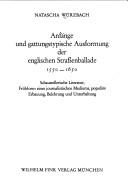| Listing 1 - 10 of 125 | << page >> |
Sort by
|
Book
ISBN: 1805110411 180511039X Year: 2023 Publisher: Cambridge, UK : Open Book Publishers,
Abstract | Keywords | Export | Availability | Bookmark
 Loading...
Loading...Choose an application
- Reference Manager
- EndNote
- RefWorks (Direct export to RefWorks)
"This deeply researched collection offers a comprehensive introduction to the eighteenth-century trade in street literature--ballads, chapbooks, and popular prints--in England and Scotland. Offering detailed studies of a selection of the printers, types of publication, and places of publication that constituted the cheap and popular print trade during the period, these essays delve into ballads, slip songs, story books, pictures, and more to push back against neat divisions between low and high culture, or popular and high literature."--

Abstract | Keywords | Export | Availability | Bookmark
 Loading...
Loading...Choose an application
- Reference Manager
- EndNote
- RefWorks (Direct export to RefWorks)
German literature --- Street literature --- Germany --- History --- Sources.
Book
ISBN: 3846746487 Year: 2008 Publisher: Paderborn : Wilhelm Fink Verlag,
Abstract | Keywords | Export | Availability | Bookmark
 Loading...
Loading...Choose an application
- Reference Manager
- EndNote
- RefWorks (Direct export to RefWorks)
Das Medium Blatt, obwohl jedem bekannt und tagtäglich genutzt, wurde von der Medienforschung bislang fast gänzlich vernachlässigt. In zwei verschiedenen, einander ergänzenden Blöcken werden hier zahlreiche Pilotstudien mit neuen Perspektiven und Befunden vorgestellt. Versionen des Blatts im Alltag umfassen dabei u.a. Eintrittskarten, Packungsbeilagen von Medikamenten, Kochrezepte, Spielkarten, Flugblätter oder Werbeblätter als Zeitungsbeilagen. Bedeutung und Funktionen des Blatts unterscheiden sich aber auch nach seiner Verwendung in verschiedenen kommunikativen Binnenräumen, beispielsweise der Schule, Kultureinrichtungen wie Bücherei oder Kulturinstitut sowie kirchlichen Räumen – bis hin zum Einkaufszettel oder der Nutzung des Blatts als Schreibmedium zur Bewältigung des Alltags. Ein einführender Forschungsbericht und ein abschließender Abriss zur Geschichte des Mediums Blatt von den Anfängen bis heute runden den facettenreichen, innovativen Band ab.
Menus. --- Printed ephemera. --- Street literature. --- Trade literature.
Book
ISBN: 2840960206 9782840960201 Year: 1996 Publisher: Paris: Parigramme,
Abstract | Keywords | Export | Availability | Bookmark
 Loading...
Loading...Choose an application
- Reference Manager
- EndNote
- RefWorks (Direct export to RefWorks)
Chapbooks, French --- Popular literature --- Street literature --- French literature --- Paris (France)
Book
ISBN: 1139105558 1108038670 Year: 2015 Publisher: Cambridge : Cambridge University Press,
Abstract | Keywords | Export | Availability | Bookmark
 Loading...
Loading...Choose an application
- Reference Manager
- EndNote
- RefWorks (Direct export to RefWorks)
Broadsheet papers were a popular forerunner of the tabloid newspaper, featuring sensational reports of current events, especially violent crimes, executions and political scandal. This collection, first published in 1871, features lurid murder stories, entertaining ballads which lampoon the politicians and royalty of their day, and commemorations of national events.
Broadsides --- Chapbooks, English. --- Chap-books, English --- English chapbooks --- Ballad-sheets --- Broadsheets --- Broadside ballads --- Journalism --- Street literature
Book
Year: 1998 Publisher: Berkeley: University of California,
Abstract | Keywords | Export | Availability | Bookmark
 Loading...
Loading...Choose an application
- Reference Manager
- EndNote
- RefWorks (Direct export to RefWorks)
Street music --- Street literature --- Chapbooks, French --- Broadsides --- Popular culture --- Books and reading --- Printing

ISBN: 0870237187 Year: 1990 Publisher: Amherst (Mass.) : University of Massachusetts press,
Abstract | Keywords | Export | Availability | Bookmark
 Loading...
Loading...Choose an application
- Reference Manager
- EndNote
- RefWorks (Direct export to RefWorks)
Beggars --- English prose literature --- Rogues and vagabonds --- Street literature --- Literary collections.
Book
Year: 1974 Publisher: Genève : Droz,
Abstract | Keywords | Export | Availability | Bookmark
 Loading...
Loading...Choose an application
- Reference Manager
- EndNote
- RefWorks (Direct export to RefWorks)
Popular literature --- Street literature --- Chapbooks, French --- Bibliography --- Catalogs --- Catalogs. --- Bibliothèque bleue (Troyes, France)

ISBN: 3770519248 Year: 1981 Publisher: München Fink
Abstract | Keywords | Export | Availability | Bookmark
 Loading...
Loading...Choose an application
- Reference Manager
- EndNote
- RefWorks (Direct export to RefWorks)
Ballads, English --- Broadsides --- English poetry --- Popular culture --- Street literature --- History and criticism --- History
Book
ISBN: 9782356875280 235687528X Year: 2017 Publisher: Lormont: Le bord de l'eau,
Abstract | Keywords | Export | Availability | Bookmark
 Loading...
Loading...Choose an application
- Reference Manager
- EndNote
- RefWorks (Direct export to RefWorks)
La 4e de couverture indique : " Utilisé traditionnellement par les autorités détenant le pouvoir, le tract s'est avec le temps imposé comme un média particulièrement prisé par les contre-pouvoirs qu'ils soient religieux, pendant la Réforme protestante par exemple, ou politiques, lors des révolutions de 1789, 1848 ou 1989, ou lorsqu'il est utilisé par des voix dissidentes au sein des partis. Il devient au fil des siècles un instrument de l'émergence d'une opinion publique et celui d'une reconquête de l'espace public par des mouvements de résistance quand celui-ci est contrôlé ou censuré par une dictature. Il est aussi utilisé comme un outil de guerre psychologique dès les guerres ottomanes et jusqu'aux deux guerres mondiales ou pendant la guerre froide. En s'appuyant sur des recherches originales, l'auteure analyse les évolutions des caractéristiques formelles et fonctionnelles de ce média et propose une histoire du tract, ce média essentiel dans l'histoire politique germanique, mais aussi occidentale. Hélène Camarade est professeure en études germaniques à l'université Bordeaux Montaigne et membre junior de l'Institut universitaire de France. Elle est spécialiste des phénomènes de résistance et des écrits de la résistance dans l'espace germanophone."
Street literature --- Pamphlets --- Public opinion --- Communication in politics --- Politics, Practical --- History --- Street literature - Germany - History --- Pamphlets - Germany - History --- Public opinion - Germany - History --- Communication in politics - Germany - History --- Politics, Practical - Germany - History
| Listing 1 - 10 of 125 | << page >> |
Sort by
|

 Search
Search Feedback
Feedback About UniCat
About UniCat  Help
Help News
News